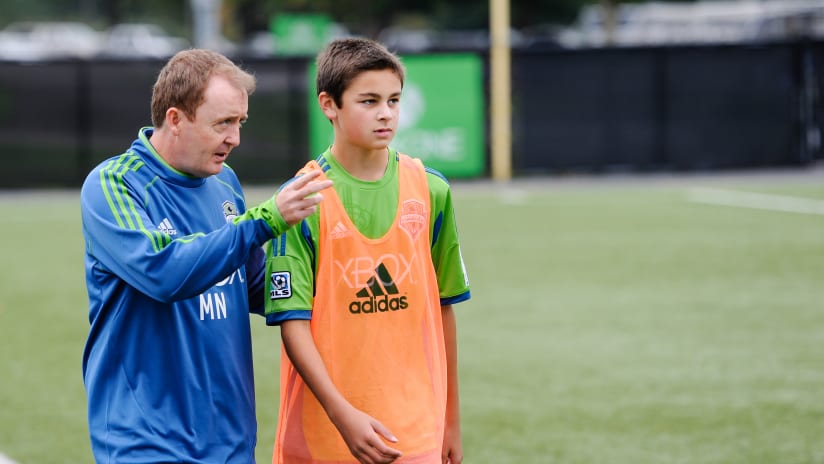TUKWILA, Wash. – After amassing several important partnerships with youth soccer clubs, both locally and nationally, Sounders FC Academy recently held their first coaching education workshop. Over the course of two days, directors and top coaches from each of the affiliate organizations observed presentations by key members of the organization, such as Academy Director Marc Nicholls and first team coach Sigi Schmid.
The sharing of resources is an important aspect of the Sounders’ youth club partnerships. Many of these organizations possess a strong track record of developing the most talented young soccer players in their respective regions. As a result, Seattle can essentially outsource some of its scouting and coaching needs to clubs traditional hot beds of talent such as Spokane, Central Washington, Hawaii, North Carolina and California.
Ethan Kilby, the Director of Twins City Soccer Association’s Junior Academy in North Carolina, was understandably enthused about the workshop.
“[It has been] really fun and really interesting to have a lot of good [soccer] minds in one area. Any times you listen to Nicholls talk, I mean he just oozes knowledge about the game and we’re all very excited to be taking part of it.”
Since the Academy program only starts at the U14 age group, it is absolutely vital that the Sounders rely on established clubs to provide high quality education for young players during their formative years.
One of the key tenants of Sounders Academy is to create autonomous players with extremely high soccer IQ’s. Presentations by Nicholls, Seattle United Junior Academy Director Dan Lock, and MLS Director of youth and player development Fred Lipka tackled this enigmatic issue from all angles. Additionally, presentations on the methodology and philosophies of world-renowned youth Academies, such as Le Havre (Paul Pogba), K.R.C. Genk (Kevin De Bruyne) and S.C. Freiburg (Matthias Ginter) provided an eclectic understanding of player development.
The primary reason that player development poses such a problem for many clubs is that soccer is such a fluid and organic sport. So, in order to teach some of the more multifarious aspects of the game, phases of play must be broken down and simplified. For example, Lock’s presentation on curriculum development focused solely on the attacking side of the game.
Working closely with Sounders Academy staff, Lock has decided that in the U8-U12 age groups, offensive play can be broken down into four key principles: passing and receiving, possession, dribbling and running with the ball, and finishing.
“It may seem complex, but it’s very simple. Buy simplifying things you can make it more effective and address specific constructs,” Lock said. “It also creates more intelligent soccer players who are well versed in every aspect of the game.”
According to both Lock and Nicholls, simplification also helps coaches by identifying what specifically makes players good at things like possession, shooting and movement. Too often young players make slight movements off the ball or clever runs that are not praised by teammates or coaches. If they continue to free up space and contribute to the flow of the game with nuanced and intelligent play but do not receive praise, they will likely stop doing the little things that are so crucial at the highest levels.
Lipka’s presentation built upon these ideas by further breaking down coaching styles into three categories: the self-adaptation, tactical, and execution models.
In the self-adaptation and tactical models, coaches adopt the role of facilitators and promote critical thinking and learning through asking questions of players and encouraging thoughtful responses. Conversely, the execution model is all about high repetition and regimented drills, with coaches taking a more hands-role to refine technique and tactics.
After each presentation, the coaches were taken to the Academy playing fields where Lipka demonstrated the nuanced differences in coaching styles between the different methods.
The second day served to reinforce some of the more significant lessons from the day before. Nicholls presented on how coaches can use this new information to improve the scouting and evaluation of players, as well as the best ways to provide feedback to young athletes. His presentation was supported by brief sessions with Schmid, Brian Schmetzer and Laura Harvey. Each of the coaches for Seattle’s professional teams discussed how they continue to educate young players as they enter the upper echelons of American soccer.
If MLS hopes to be one of the top leagues in the world, then it must adopt a ground-up approach that focuses on player development. In order to do so, the quality of coaching education must improve nationwide.
“I think the partnership [with Sounders] is huge,” said Spokane Shadow Technical Director Abbas Faridnia. “It’s huge for our community, huge for our coaches. Hopefully in the long-term it develops, not only our players, but our coaches as well. It [the partnership] can impact our coaches and impact our players through them.”
With workshops such as this, the Seattle Sounders organization is taking an incredibly proactive step in the right direction.







